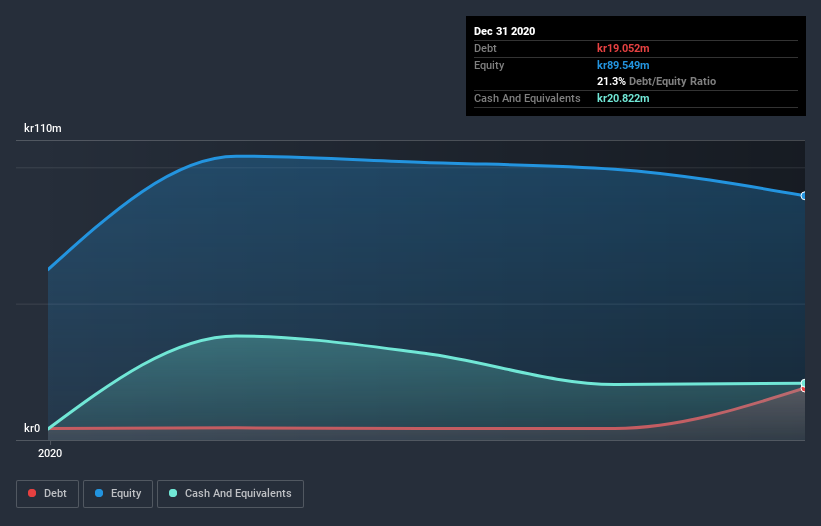
David Iben put it well when he said, 'Volatility is not a risk we care about. What we care about is avoiding the permanent loss of capital.' So it seems the smart money knows that debt - which is usually involved in bankruptcies - is a very important factor, when you assess how risky a company is. As with many other companies Qlife Holding AB (publ) (STO:QLIFE) makes use of debt. But is this debt a concern to shareholders?
What Risk Does Debt Bring?
Debt and other liabilities become risky for a business when it cannot easily fulfill those obligations, either with free cash flow or by raising capital at an attractive price. Part and parcel of capitalism is the process of 'creative destruction' where failed businesses are mercilessly liquidated by their bankers. While that is not too common, we often do see indebted companies permanently diluting shareholders because lenders force them to raise capital at a distressed price. By replacing dilution, though, debt can be an extremely good tool for businesses that need capital to invest in growth at high rates of return. The first thing to do when considering how much debt a business uses is to look at its cash and debt together.
View our latest analysis for Qlife Holding
How Much Debt Does Qlife Holding Carry?
You can click the graphic below for the historical numbers, but it shows that as of December 2020 Qlife Holding had kr19.1m of debt, an increase on kr4.19m, over one year. But it also has kr20.8m in cash to offset that, meaning it has kr1.77m net cash.

How Healthy Is Qlife Holding's Balance Sheet?
Zooming in on the latest balance sheet data, we can see that Qlife Holding had liabilities of kr33.6m due within 12 months and liabilities of kr4.05m due beyond that. On the other hand, it had cash of kr20.8m and kr17.1m worth of receivables due within a year. So these liquid assets roughly match the total liabilities.
This state of affairs indicates that Qlife Holding's balance sheet looks quite solid, as its total liabilities are just about equal to its liquid assets. So while it's hard to imagine that the kr555.4m company is struggling for cash, we still think it's worth monitoring its balance sheet. Simply put, the fact that Qlife Holding has more cash than debt is arguably a good indication that it can manage its debt safely. When analysing debt levels, the balance sheet is the obvious place to start. But you can't view debt in total isolation; since Qlife Holding will need earnings to service that debt. So if you're keen to discover more about its earnings, it might be worth checking out this graph of its long term earnings trend.
Over 12 months, Qlife Holding reported revenue of kr43m, which is a gain of 273%, although it did not report any earnings before interest and tax. When it comes to revenue growth, that's like nailing the game winning 3-pointer!
So How Risky Is Qlife Holding?
We have no doubt that loss making companies are, in general, riskier than profitable ones. And we do note that Qlife Holding had an earnings before interest and tax (EBIT) loss, over the last year. And over the same period it saw negative free cash outflow of kr44m and booked a kr20m accounting loss. However, it has net cash of kr1.77m, so it has a bit of time before it will need more capital. Importantly, Qlife Holding's revenue growth is hot to trot. While unprofitable companies can be risky, they can also grow hard and fast in those pre-profit years. There's no doubt that we learn most about debt from the balance sheet. However, not all investment risk resides within the balance sheet - far from it. For example - Qlife Holding has 4 warning signs we think you should be aware of.
If, after all that, you're more interested in a fast growing company with a rock-solid balance sheet, then check out our list of net cash growth stocks without delay.
If you’re looking to trade Qlife Holding, open an account with the lowest-cost* platform trusted by professionals, Interactive Brokers. Their clients from over 200 countries and territories trade stocks, options, futures, forex, bonds and funds worldwide from a single integrated account. Promoted
If you're looking to trade Qlife Holding, open an account with the lowest-cost platform trusted by professionals, Interactive Brokers.
With clients in over 200 countries and territories, and access to 160 markets, IBKR lets you trade stocks, options, futures, forex, bonds and funds from a single integrated account.
Enjoy no hidden fees, no account minimums, and FX conversion rates as low as 0.03%, far better than what most brokers offer.
Sponsored ContentValuation is complex, but we're here to simplify it.
Discover if Qlife Holding might be undervalued or overvalued with our detailed analysis, featuring fair value estimates, potential risks, dividends, insider trades, and its financial condition.
Access Free AnalysisThis article by Simply Wall St is general in nature. It does not constitute a recommendation to buy or sell any stock, and does not take account of your objectives, or your financial situation. We aim to bring you long-term focused analysis driven by fundamental data. Note that our analysis may not factor in the latest price-sensitive company announcements or qualitative material. Simply Wall St has no position in any stocks mentioned.
*Interactive Brokers Rated Lowest Cost Broker by StockBrokers.com Annual Online Review 2020
Have feedback on this article? Concerned about the content? Get in touch with us directly. Alternatively, email editorial-team (at) simplywallst.com.
About OM:QLIFE
Qlife Holding
A med-tech company, manufactures and sells in-vitro diagnostic analyzers and reagents in Sweden.
Medium-low with imperfect balance sheet.
Market Insights
Community Narratives




